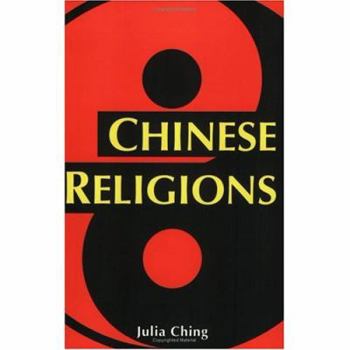Chinese Religions
Select Format
Select Condition 
Book Overview
This is a comprehensive work on the religions of China. As such, it includes an introduction giving an overview of the subject, and the special themes treated in the book, as well as detailed chapters... This description may be from another edition of this product.
Format:Paperback
Language:English
ISBN:0883448750
ISBN13:9780883448755
Release Date:August 1993
Publisher:Orbis Books
Length:250 Pages
Weight:0.85 lbs.
Dimensions:0.7" x 5.5" x 8.5"
Customer Reviews
3 ratings
Readable and informative global summary
Published by Thriftbooks.com User , 14 years ago
This good introduction to all the religions in China has chapters on indigenous traditions (Part I), on the response of these to foreign religions (Part II), and on syncretism (Part III) structure the book. The writing is the work of a scholar who is writing for educated, general readers. She does not define many concepts, except by oblique references. As to religion, for instance, in one place (84), she writes "consciousness of a transcendent dimension." In other place (11), she writes, "belief in a hierarchy of gods, human condition is sinful, ritual practices and prayer bridge the gap between human and divine." As to China, she most frequently refers to a cultural entity constituted in "Confucianism," which controls responses to other native and foreign religions. Part 1 is about these indigenous traditions -- about archaic religions and about "Confucianism" and "Taoism," the traditions that differentiated in the Warring States period (475-221) and consolidated in the Han Dynasty (206-220 AD). These traditions rationalized the archaic state and ancestral allegiance to the state in a central conviction of "human perfectibility." Part 2 is about Buddhist, Christian, Islamic, and minor invasions, all of which confronted the doctrine of human perfectibility with with variations on defining perfectibility as (1) for the person or (2) for the state. Any opposition to the centrality of the state in these traditions was fated to lose out because the doctrine of perfectibility must fit state ideology. Part 3 is about the future of religion in China. She is no more predictive than is any other writer. Two scenarios for the future make up Part III. First, the "popular religion" of spirit healers, diviners, domestic deities, deities of the historic religions, ghosts, and the ethical cults "will also be the religion of the future" (220), a statement that is not clarified. Second, she writes that harmonization is so strong a preference thanks to the force of Confucianism and Marxism that we can expect "undisclosed spiritual horizons in the future." (230) She provides a chronological table, but she treats religious literature in an analytic fashion. She refers to scholarly categories such as Weber's, but makes no definitive, consistent theoretical use of these. She writes good, succinct, descriptions of religious traditions; quotes specific texts; and explains many Chinese-language terms. She refers occasionally to comparable situations in Korea and Japan, throughout to archaeology and history, and regularly to scholarly literature. It is a very readable, informative book.
Very Good Basic Text
Published by Thriftbooks.com User , 22 years ago
First, let me say that Ching's Chinese Religions should be viewed as a scholarly text. It is not, nor intended to be, summer "beach reading." That said, I must say that Ching did a very good job writing a book that would be a wonderful accompaniment to a college course on either Chinese religion, or Chinese philosophy. She begins chronologically with the "Indigenous Traditions" of China and progresses through Confucianism, Taoism, Buddhism and finally the integration of Christian and Islamic influence in Chinese religion. Ching discusses the uniqueness of the Chinese religion, in that it is a conglomeration of many different religious and philosophical influences, and she illustrates how these many influences have come to form a synchronistic relationship between many schools of thought. If I could make two suggestions to Julia Ching, they would be to add a chapter on the rise of Falun Gong in China, and the subsequent oppression by the Communist Party. Secondly, add some excerpts from the religious texts she cites in her work. I'm sure this would add clarity.
One of the better books on Chinese religion
Published by Thriftbooks.com User , 25 years ago
Ching's book is one of the better books on Chinese religion. Her writing is clear and she gives the reader all of the necessary information without burdening one in trivial details. She covers the origins of Chinese religion up to the present, even covering how Judaism, Islam, and Christianity have fared in China. Ching's account of Taoist religion is very insightful. Amazingly, she covers China's entire religious history in 230 pages without simply skimming the surface of Chinese religion nor going into detail in some areas while neglecting others. Her book was an insightful and enjoyable read.






